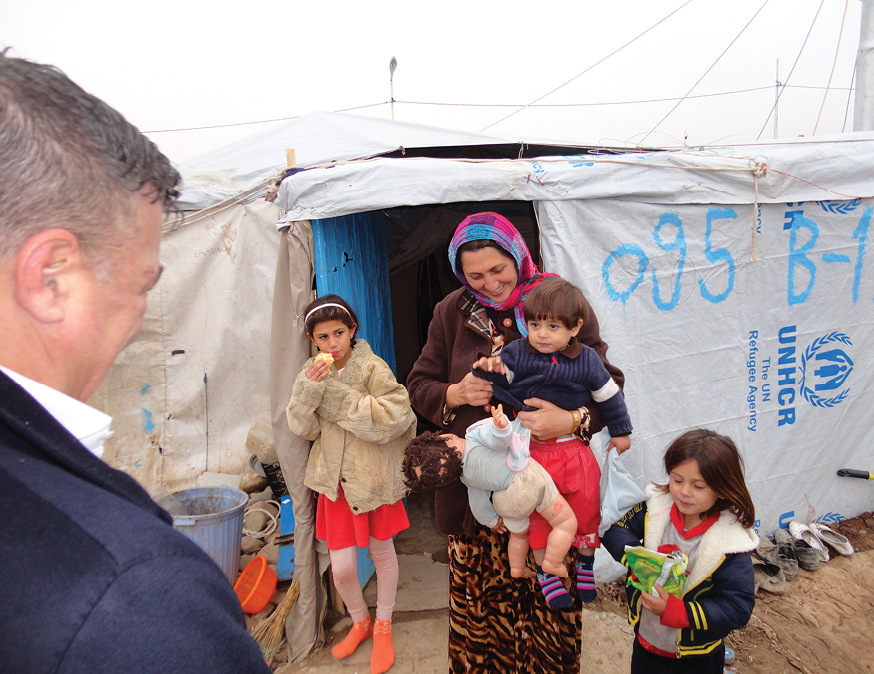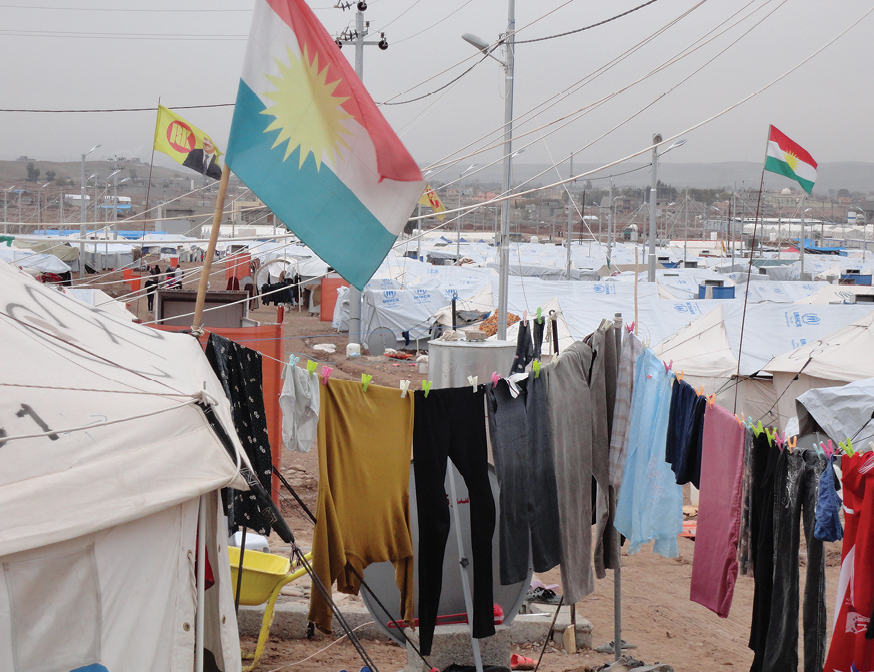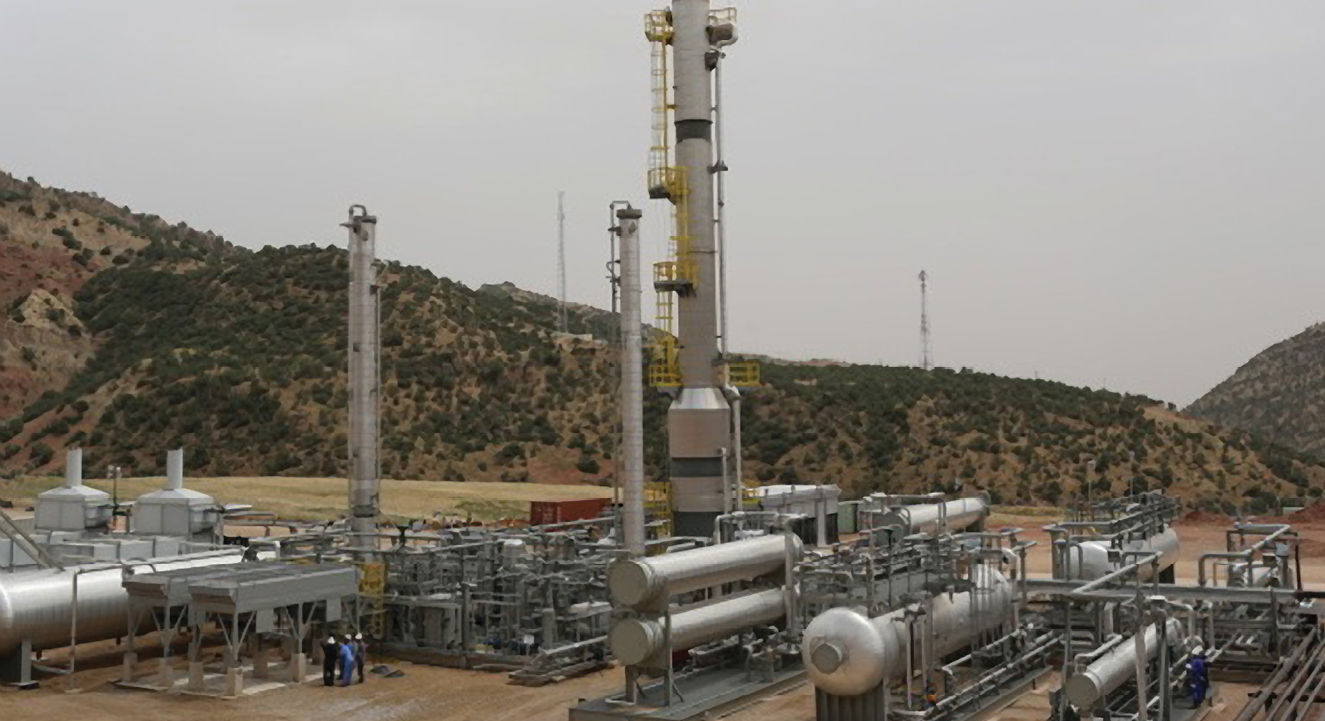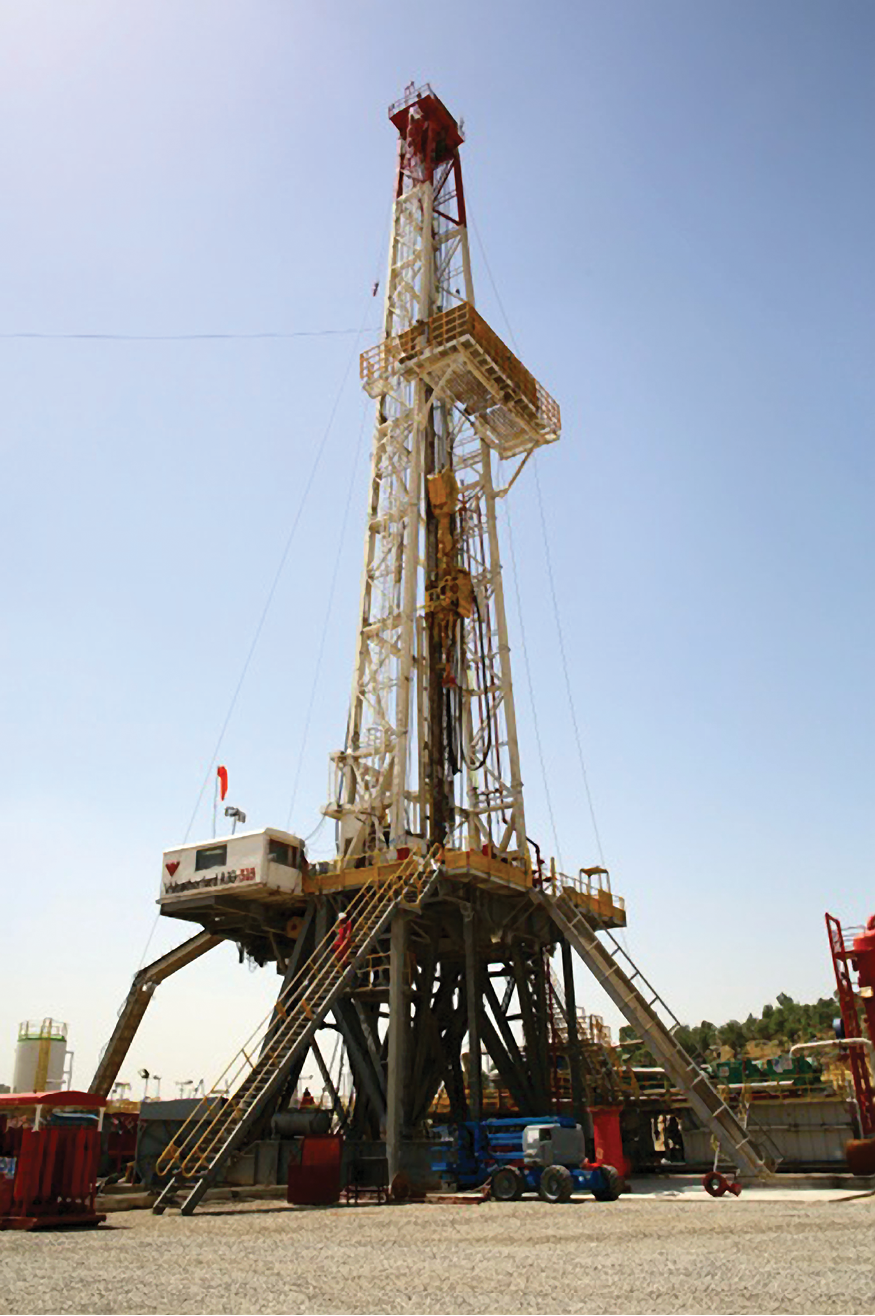


![]()
ONLINE

Committed to Kurdistan
Editors’ Note
Todd Kozel co-founded Gulf Keystone Petroleum. In 1988, Kozel founded Texas Keystone Inc., an independent oil and gas exploration, development, and production company, headquartered in Pittsburgh, Pennsylvania. Kozel served as Texas Keystone’s President from 1995 to 2004 and has served as a director since 1988. He also co-founded Falcon Drilling Company LLC, an American independent drilling and oilfield services company, in 2001 and serves on its board of directors.
Company Brief
Gulf Keystone Petroleum Limited (gulfkeystone.com) is an independent exploration and production company, and a leading operator in the Kurdistan Region of Iraq, where it holds a balanced portfolio of exploration, development, and production assets with five discoveries across four on-trend blocks: Shaikan, Sheikh Adi, Akri-Bijeel, and Ber Bahr. As one of the first companies to see the potential of the region, over the past six years, Gulf Keystone has drilled or participated in nearly 20 wells and remains one of the most active operators in the Kurdistan Region of Iraq. Gulf Keystone has one of the largest onshore developments in the world today and the company is moving into a phase of significant production.
What was your vision for Gulf Keystone when you started it?
It was a challenge to start my own company. My brothers and I got very involved in exploration and development of the Appalachian area and Texas, and I thought I was doing well.
A friend of mine, who was the head of planning and control at an oil company, invited me to come to Kuwait right after the first Gulf War.
I drove through the greater Burgan oil fields because I wanted to see the first Burgan oil field that was drilled by Gulf Oil Pittsburgh. My father, mother, and uncle had all worked there so it was a novelty to see the first oil wells that the company had drilled there.
I was surprised to learn that there was an eight-inch steel gathering line for each well. I had always thought I was doing really well, running a single line of that size for an entire field. This woke me up to the fact that there is a whole oil and gas world out there that is beyond the scope of the Continental U.S. The true exploration of those world-class size resources fascinated me.
I became determined to start an international oil and gas company. It took a few years. My family and I had grown the company to the point where it was one of the largest and most active oil and gas companies in the U.S., and our drilling company was one of the most active drilling companies in the States. But after I learned of this international possibility, I became intrigued by the opportunity to export the cost-effective U.S. independent model.
The objective was to develop smaller resources that had been overlooked by the major economies and multinationals. We knew that we could find the needle in the haystack somewhere, which eventually led us to Kurdistan.
However, we started in Algeria with one asset and built that into a portfolio of seven, with each getting bigger as they went along. Then the prospect of Kurdistan came about, and lo and behold, via old-school exploration, we found one of the biggest fields discovered in decades.
I thought I had been a master of the universe but I found out there was a much bigger universe than I was even aware of.
We’re going
to be a good corporate citizen
in the countries we are in. We will
be a part of their cities, towns,
and villages.
How difficult was it to enter international markets like Algeria and Kurdistan?
As an American independent, we had to be involved in every step of the process. We immersed ourselves in the process, respecting that countries are different in their regulatory environments and legal frameworks. We knew that we would have to deal with the national oil companies and the national ministries. The game can change completely from country to country.
What enabled us to be successful was that our approach was perceived as a breath of fresh air by those that I dealt with because they had the founder and CEO sitting at the table. I went to visit the state oil companies and the ministers myself. I had to learn the cultures and how they do business. I had to accept the challenges as challenges, not as roadblocks. We had to accept that we were a guest in the country. We’re invited into a country to do our work and drill for oil, and ultimately to produce oil and gas that gives an acceptable rate of return to our shareholders.
But we’re not building widgets or trading hedge funds; we can’t pick up our equipment and go home. We drill for oil and gas, we lay a pipeline, and we build a processing facility, so we’re going to be there for 25 or 30 years.
The first determination we have to make is whether the country is going to be a place where we can work. We flew to Kurdistan to check it out. All of our guys came back home but I went back and spent two weeks traveling the country.
We had to ascertain whether it was an environment where they want oil and gas development and whether it is an environment, both politically and bureaucratically, where we could efficiently work. We were looking to see if there was a framework in place that provides some possibilities for our logistics and for our people. For example, there was only one drilling rig in Kurdistan when we showed up.

Todd Kozel visiting the Syrian refugee camps
for which Gulf Keystone Petroleum
has provided extensive support
We’re going to be a good corporate citizen in the countries we are in. We will be a part of their cities, towns, and villages.
We’re also a guest in the country, so we had to believe that we could become a part of the fabric of the country. It isn’t about just showing up and taking profits for shareholders and running for the hills.
The countries want us to help bring in technology, investment, and know-how, but they also want us to train their people. They want us to teach young people how to be engineers, welders, truck drivers, and geologists.
They want us to come and do our business, but leave the country in a better condition than we found it. This is a key driver for everything that I do.
Does this process require a larger investment going in?
It requires a bigger investment of ourselves: our passion, our time, and our minds. We don’t have to invest dollars to try to understand the community in which we do business. We don’t have to pay dollars to learn the culture, the people, the sensitivities and what is important to those people in order to create a good corporate culture that works in the place we’re doing business.
How significant is the opportunity in Kurdistan and how have the operations there progressed for Gulf Keystone?
Kurdistan is an amazing place. In 2006, there were few of us on the ground. The reason I went first is that I won’t ask anybody who works for me to do something I won’t do.
The vision of Kurdistan is the one that CNN shows us on the news, but when you go, you find it’s completely safe. I never had one person who I’ve taken to Kurdistan who said they would not go back.
Since 2008, it’s just gotten better. We’re in an enviable position where we can now work with the government, which wasn’t possible before. We have been able to consult with the government on environmental policies, damage payments to locals, community participation, charitable works, road transportation, and import/export issues. As all of this has developed, the region has gotten so much better. It looks like Dubai in 1990.
They have the desire from their side and enthusiasm from the investors’ side. I would encourage anybody who wants to do business in that part of the world to go to Kurdistan.
Have you been able to find the local workers there who can perform at the levels you need?
No, that is going to take a long time. Since Kurdistan was an anomaly under Saddam Hussein, its economy was devoid of this industry.
So in 2007/2008, when we established our office, we hired young people but we also sponsored chairs and departments at universities to enhance the study of petroleum geology and petroleum economics.
We are now recruiting young people from those universities to join our staff. Each week, we offer Gulf Keystone University where our senior people continue to teach young people who have graduated from the university about oil and gas. So on the job, they’re continuing to receive more of a classroom-type education.
We offer classes twice a week in our office and they’re free for anybody who wants to sit through them. Our employees can take time from their positions for those hours and come to school.
Our staff in country is currently 75 percent Kurdish at all levels.

Todd Kozel visiting the Syrian refugee camps
Are there still markets out there with the potential of Kurdistan?
Kurdistan is the last great onshore province for a potential major oil producing region that had been undiscovered. It was an isolated region. Politically, it was a forbidden region.
It’s that American independent philosophy that helps us take advantage of opportunities quicker. We can also take more risk; we can get into the countries, sit down with the people, and get comfortable with a country in a way that the majors can’t.
We also have an early mover advantage. Gulf Keystone has a market cap in the billions of dollarsthanks to the risk we took in Kurdistan.
You’ve also put health, safety, and the environment in the forefront. How important is that to the company culture and to being a business leader?
Health, safety, and the environment (HSE) are all really important to us. We worked 250,000 man hours this year. We only had a handful of minor incidents, so those are amazing statistics.
But we can do better. I want our employees to always go home the same or better than how they came to work.
It’s amazing how Kurdistan has picked up quickly on HSE. It’s part of every management team and committee that we have with our partner, the KRG – Kurdistan Regional Government.
There have been some notable accidents in the oil and gas industry, so HSE is really important industry-wide. We’re not approaching it differently in a way but we’re trying to live up to a higher standard.

Gulf Keystone Petroleum rig in Kurdistan
Did you have an entrepreneurial drive early on? Did you know you would take this path?
Not at all. I grew up in the business working with my father, and he came to visit me at the university in my last year and asked me what I wanted to do. I told him I wanted to get into the oil and gas business. He said, “Fine, but if you do, you aren’t going to work for me. If you want to start your own business, I will help you in any way I can. But your first step should be finding a good lawyer.”
A week later, the lawyer called my father and told him that he was meeting with his son, a senior at the university, who was asking to start an oil company. I just love the business. I worked as I grew up painting oil and gas wells, laying pipelines, hooking up gas wells, driving bulldozers, and cutting down trees for drilling locations. For a teenage boy, getting paid to do that was fantastic.
At the same time, I fell in love with the business. I always wanted to be in it. I never imagined, however, that a boy from Pennsylvania would be addressing the Prime Minister of Kurdistan.
I’m very grateful for it because it has been enriching and satisfying beyond expectation. Besides the oil and gas business, we have helped a people build a nation and gain autonomy. We have been at the forefront of that movement and it has been amazing.
My grandkids will be on my knee one day and I will have a lot of stories to tell them.
I fell in love with the business.
I always wanted to be in it. I never imagined, however, that a boy from Pennsylvania would be addressing the Prime Minister of Kurdistan.
What’s it like to work for you? How engaged are you and have you had to step back as the business has grown?
Texas Keystone, the original company I created with my father, was a different kind of business than what we have today. From the Texas Keystone days to the Gulf Keystone days, we have always had great people who have been loyal and enthusiastic, so there has been very little turnover. My philosophy is simple: Hire good people and give them the respect these professionals deserve. I don’t stand over their heads and tell them what to do every day, because they know what to do. These guys have been in this industry for 30 years and have worked for some of the biggest companies in the world.
I’m not authoritarian. I make a decision and it always falls eventually on the CEO’s head. The credit and the criticism should also go all the way to the top if you’re running a good organization.
I have four key guys who work closely with me. Their opinion matters just as much as mine.
I may not be the smartest guy in the room but I have a lot of experience. I value everyone’s opinion and that builds a team spirit where one guy doesn’t want to let the other one down.
This creates what is, more or less, a business family – this description comes from those who have worked with me.
How tough is it to maintain the culture with the kind of rapid growth you’ve had?
That challenge certainly exists. People buy into the internal culture because they live it every day. If you lead by example, everybody buys into it. As you grow, it becomes about the external factors – the suppliers, maybe the government, and shareholders who have different expectations of companies as they see them changing and growing.
What I like to remind everybody is, this culture is what has made the company successful. The culture helped create a substantial company. As you evolve, some things have to change, but that fundamental basic culture keeps people coming to work.
You have to create a basic culture that makes everybody want to perform at 100 percent. We can’t just say, now we’re a very large company so we’re going to work in a completely different way.
It requires being hands-on; it requires that I still go to Kurdistan and sit with staff; it requires me to sit with my team; it requires my team to spend time with each other, and I encourage them when they’re in Kurdistan to do the same things I do. I don’t act any differently than I expect the newest employee or the oldest employee to act.

Gulf Keystone Petroleum rig in Kurdistan
Why did you decide to get involved in the Syrian refugee issue?
In Kurdistan, our fields are near the Syrian border, so we were able to see the refugee situation unfold firsthand. Last September, the Ministry of Natural Resources called in all the operators and service companies and told them they had a problem. Kurdistan had over 200,000 refugees – a large portion of which were children.
This is in an area of Iraq that is not on the high list for U.N. or foreign support. Kurdistan was trying to support these refugees on their own.
We have drilled a lot of water wells and built schools, and we have supplied schoolchildren with coats, jackets, and book bags, as well as community centers.
I had spent a lot of time in Syria and I have very good friends from there so I decided that $1 per barrel we produce will be donated to Syrian refugees, and the Oil Ministry had offered to match our contributions dollar for dollar. Our donations to date are estimated to be between $10 and $12 million, which is far in excess of anybody else’s.
Then I went to the camps myself and saw how these people were living. I was emotional at first, but then watched the kids singing and laughing, and it renewed my faith in humanity.
I went to see the Minister after the tour – we agreed to front-end load our donations with blankets, food and drinks, and winter clothes because winter was coming. We did an entire winterization project for one of the camps where we agreed to donate the money as long as they built the projects themselves. So we hired the refugees directly. We gave them tools, the stone, the culvert pipes, and the winter installation materials, and then showed them what to do, and they did all the work themselves and we paid them. Not only were we helping the refugees and their families, but everybody pitched in to better their own lives.
We’re going to continue the effort, including building a recreational center for the kids because they have nothing to do all day to keep them occupied.
I met a woman in Syria who lives with her four children in a tent and she invited me in for tea, and I spoke to her through an interpreter. She told me she was making the best of a very bad situation for her family. How could you not help somebody like this?•